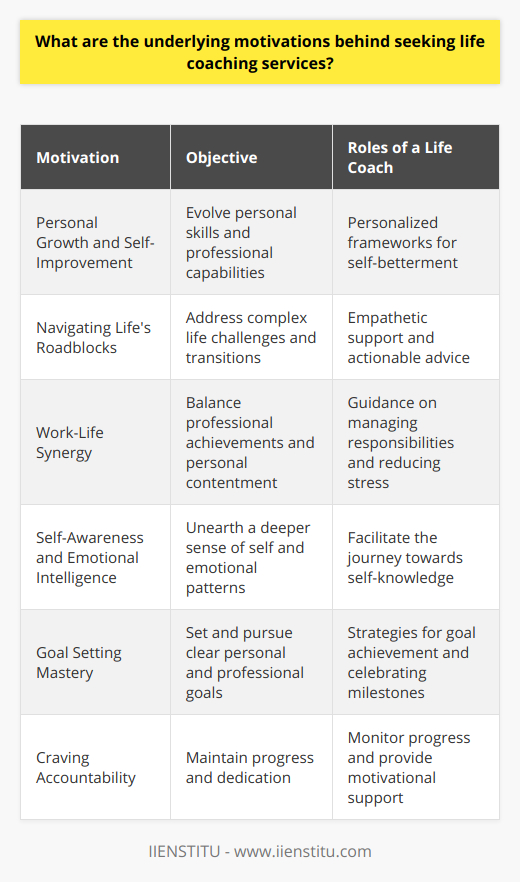
Are you thinking of becoming a certified life coach? If so, you're on the right track! There are many reasons why getting certified is an intelligent decision, and in this post, we'll discuss just a few of them. Please keep reading to learn more about the benefits of certification and why it's such an essential step in your career.
Become a Certified Life Coach
Why Get Certified As a Life Coach? The answer is simple: because it will help you to be a better life coach. When you become certified, you show potential clients that you have taken the time to learn about the coaching process and that you are committed to providing them with quality service.
In addition, certification gives you access to valuable resources and networking opportunities. By becoming certified, you can take your career to the next level and make a real difference in the lives of your clients.
The life coaching industry is proliferating and is expected to reach $5.8 billion by 2025
The life coaching industry is proliferating and is expected to reach $5.8 billion by 2025 and certified As a Life Coach? Many people choose to become certified life coaches in order to improve their career prospects and to earn potentially. Although the job market for life coaches is expected to grow significantly in the coming years, competition for jobs will likely be fierce. As a result, those who are interested in becoming life coaches should consider obtaining certification from an accredited institution. While certification is not required to become a life coach, it can provide aspiring coaches with the skills and knowledge needed to be successful in this competitive industry.
İnspiring Films About Life Coaching And Personal Transformation
How To Start A Successful Life Coaching Business Without Common Mistakes
There are many different types of certification programs available, so you can find one that fits your needs and interests.
If you want to become a life coach, our internationally accredited life coaching certificate is the perfect place to start. You'll learn from an expert trainer and gain the skills and knowledge you need to start your coaching career. The course covers everything from setting up your business to marketing and client relations. You'll also learn how to deliver practical coaching sessions and how to support your clients through difficult times. Whether you're looking to start your own coaching business or to coach within a company or organization, this course will give you the foundation you need to succeed. So don't miss out - sign up today.
Certification shows clients that you are serious about your work and have the necessary skills and knowledge to help them achieve their goals.
When you're starting out in any new field, it can be challenging to stand out from the crowd. There are always a lot of people vying for the attention of potential clients, and it can be hard to know how to make your voice heard. One way to show that you're serious about your work and that you have the skills and knowledge to help your clients achieve their goals is by getting certified. Certification shows that you've put in the time and effort to learn about your field and that you have the skills to back up your claims. In a sea of competition, certification can be the thing that sets you apart from the rest and helps you land the clients you want.
How Have You İmproved Your Problem Solving Skills İnterview Question
Difference Between Personal Development Coach And Life Coach
How To Develop Critical Human Resources Skills For Successful Hr Career
It also builds trust and credibility with potential clients, which can lead to more business opportunities.
Being certified as a life coach can provide many benefits. It can give you the skills and knowledge you need to help others reach their potential. It also builds trust and credibility with potential clients, which can lead to more business opportunities.
In addition, being certified as a life coach can give you a sense of achievement and satisfaction. It can also help you to network with other professionals in the field. Certification can open up many doors and provide you with the tools you need to be successful in your career. If you are considering a career in coaching, certification is an essential first step.
Certification provides you with a sense of accomplishment and helps you stay motivated in your work.
When you become certified as a life coach, it provides you with a sense of accomplishment and credibility in your work. It also inspires you to keep learning new things so that you can be the best coach possible for your clients. The knowledge and skills that you gain from getting certified can help to set you apart from other coaches who are not certified.
In addition, clients will often feel more confident working with a coach who has been certified by a reputable organization. Ultimately, becoming certified as a life coach can help you to build a thriving coaching business.
Finally, it allows you to network with other professionals in the field.
When you become certified as a life coach, it allows you to connect with other professionals in the field. This can be an invaluable resource when you're starting out in your career. You can connect with other coaches who can provide support and advice.
In addition, you can attend conferences and workshops where you can learn from the best in the business. Certification can also provide you with access to exclusive resources that can help you to build your coaching business. If you're looking to take your career to the next level, certification is a great way to do it.
So why get certified as a life coach? There are many reasons. Certification can show clients that you are serious about your work and have the necessary skills and knowledge to help them achieve their goals. It also builds trust and credibility with potential clients, which can lead to more business opportunities.
In addition, certification provides you with a sense of accomplishment and helps you stay motivated in your work.
A life coaching certification can help you build trust and credibility with potential clients, provide you with a sense of accomplishment, and help you stay motivated in your work. If you're interested in becoming a certified life coach, there are many different programs available to choose from. We recommend doing your research to find one that fits your needs and interests. When it comes time to get certified, be sure to showcase your certificate on your website and in marketing materials. This will show clients that you are serious about your work and have the necessary skills and knowledge to help them achieve their goals.
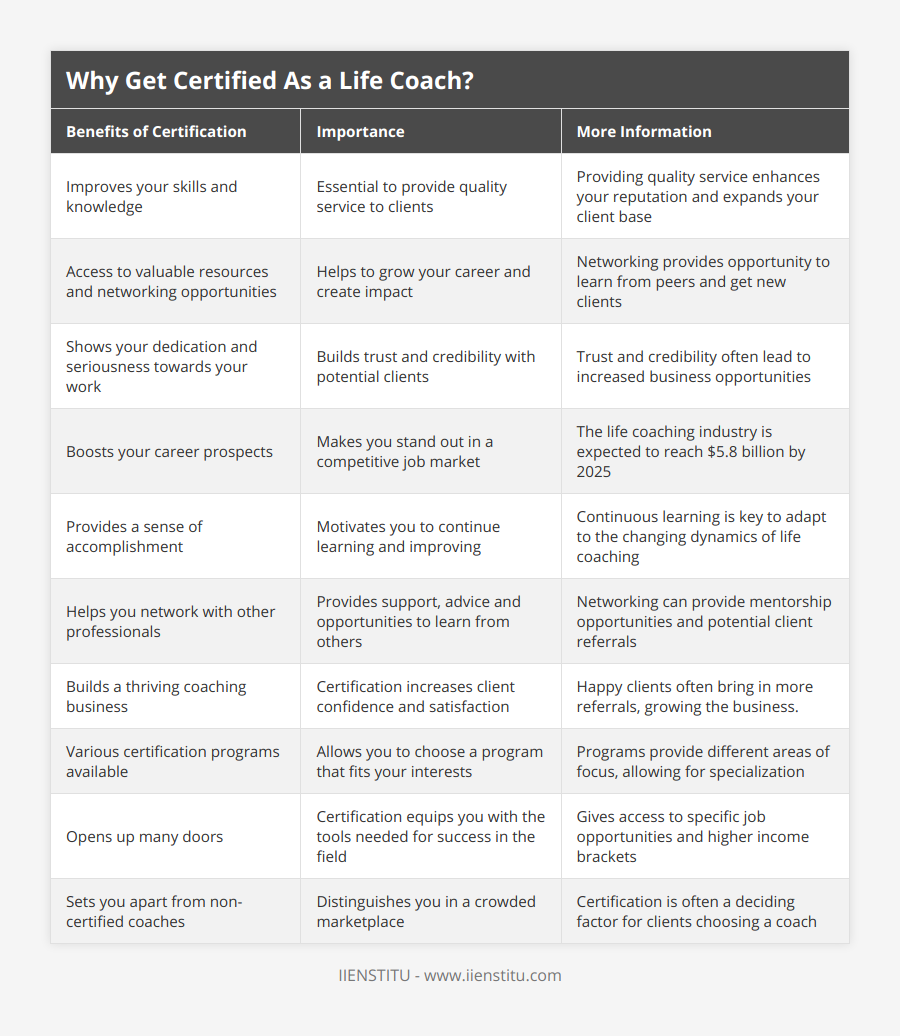
Frequently Asked Questions
What are the benefits of becoming a certified life coach?
There are many benefits to becoming a certified life coach. As a life coach, you will be able to help others achieve their goals and improve their lives. You will also gain satisfaction from seeing your clients succeed.
In addition, as a certified life coach you will be able to command higher fees than non-certified coaches. This is because certification gives you an edge over the competition and shows potential clients that you are serious about your profession.
If you are looking for a rewarding career that allows you to make a difference in people's lives, then becoming a certified life coach is the right choice for you!
What type of person makes the best life coach?
The best life coaches are usually people who have faced and overcome difficult challenges in their own lives. They have learned what works and what doesn't work for them, and they have the compassion and understanding to help others do the same.
Life coaches need to be good listeners, compassionate, patient, non-judgmental, and honest. They also need to be good organizers and problem-solvers, able to help their clients set and achieve goals. Because life coaching is a relatively new field, it's important that potential life coaches undergo proper training and certification.
What are the biggest challenges you face as a life coach?
There are a few different challenges that I face as a life coach. First and foremost, I need to ensure that my clients are comfortable with me and feel like they can trust me. I also need to be able to keep my own life in order so that I can be the best possible coach for them. Additionally, helping people make significant changes in their lives is not always easy and takes a lot of patience on my part. Lastly, being a life coach can be lonely at times since it is such an intimate process.But overall,I absolutely love being a life coach and wouldn't trade it for anything in the world!
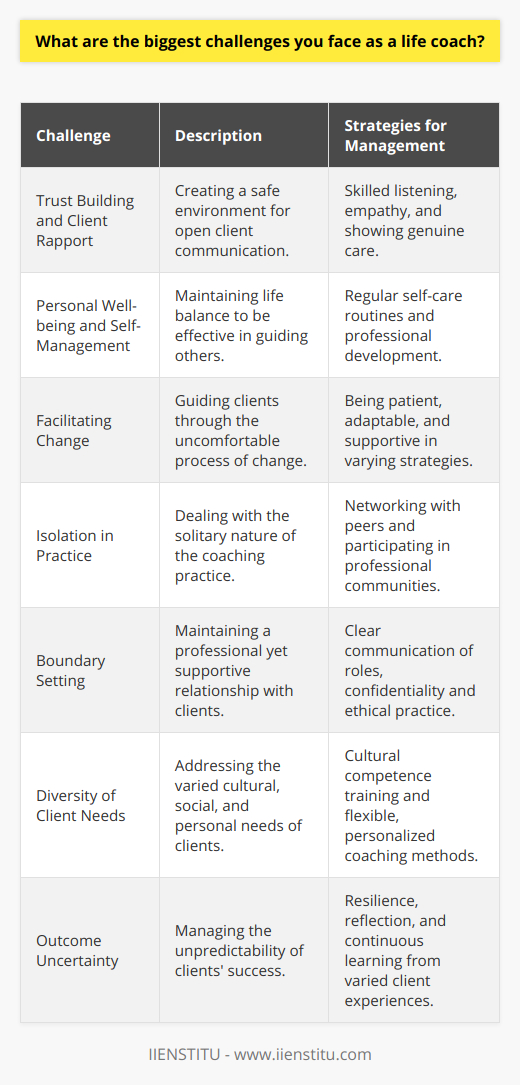
Why do you need a life coach certification?
Importance of Life Coach Certification
Life coaches play a vital role in helping individuals uncover their potential and overcome obstacles to achieve personal and professional goals. Obtaining a life coach certification increases credibility, enhances professional image, and expands opportunities for career growth.
Credibility Enhancement
Life coach certification facilitates trust-building with clients who seek assurance that they will receive guidance from an expert in the field. This certification signifies that the life coach has undergone rigorous training and has acquired the necessary knowledge and skills to support clients effectively. Thus, certified coaches gain credibility leading to increased client confidence and satisfaction.
Professional Image Enhancement
Life coach certification demonstrates a commitment to high ethical standards, continuous learning, and maintaining a professional demeanor. A certified life coach adheres to the guidelines set by accrediting organizations, ensuring a consistent and structured approach to coaching. Displaying a certification enhances a coach's professional image, setting them apart from non-certified competitors.
Opportunities for Career Growth
Pursuing a life coach certification opens up more job opportunities, networking prospects, and professional collaborations. Certification provides a competitive edge during job interviews and helps attract high-quality clientele. Moreover, certified coaches can access additional resources and networking opportunities through their affiliating institutions, further enhancing their career paths.
In conclusion, life coach certification plays a significant role in building credibility, enhancing one's professional image, and expanding opportunities for career development. Obtaining certification conveys a commitment to excellence, quality, and adherence to ethical standards in the field, thus attracting more clients and unlocking further opportunities for growth.

Is it worth getting life coach certification?
Significance of Certification
Life coach certification is worth considering for several reasons. Firstly, obtaining certification establishes credibility as it demonstrates that the life coach has undergone a rigorous training program and met the necessary requirements to acquire a recognized credential.
Enhanced Skills and Techniques
Certified life coaches gain the benefit of advanced skills and techniques developed through the training process. These tools enable them to provide more effective and personalized coaching to their clients, thereby increasing the probability of positive outcomes.
Increased Marketability
Holding a life coaching certification also improves marketability in a competitive field. As the demand for life coaches grows, potential clients seek out professionals who hold relevant qualifications to ensure that they receive the best possible support and guidance. A certified life coach is likely to attract a more extensive client base, leading to higher earning potential.
Professional Network and Community
Another benefit of life coach certification is the access to a professional network and community. This offers coaching professionals unparalleled opportunities to collaborate, share experiences, learn from each other, and establish connections that may lead to potential referrals or collaborative projects.
Adherence to Ethical Standards
Lastly, certified life coaches adhere to ethical standards set by accrediting bodies, such as the International Coach Federation (ICF). Complying with these ethical guidelines helps ensure that clients receive a consistent and high-quality coaching experience, which contributes to the overall integrity of the profession.
Conclusion
In summary, obtaining life coach certification is worthwhile for those seeking to establish credibility, enhance their skills and techniques, improve their marketability, gain access to a professional network, and adhere to ethical standards. It is an essential investment that reinforces the value and professionalism of life coaching as a career choice.
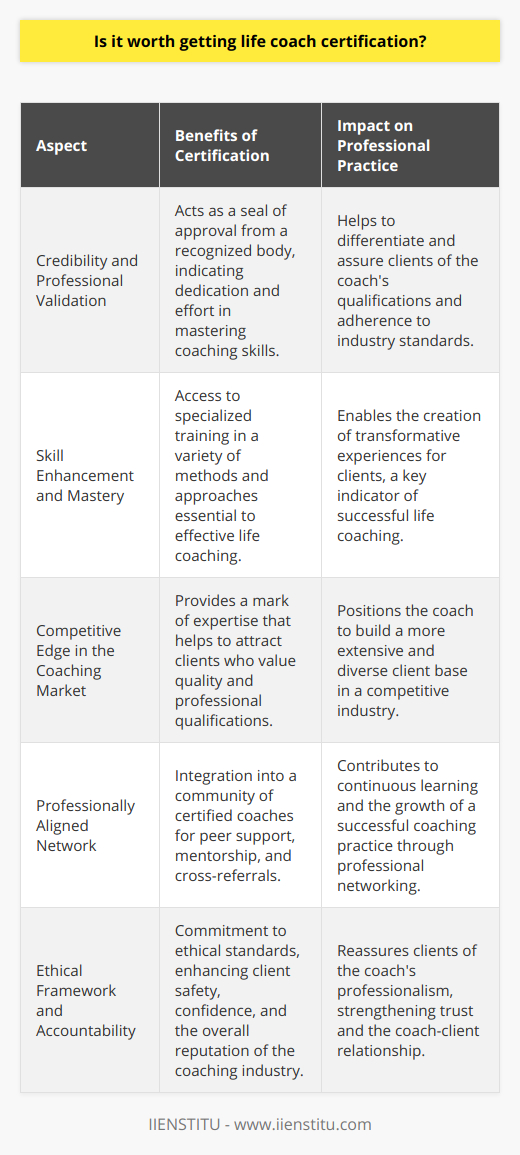
What are the benefits of getting a life coach?
Life Coaching Defined
Life coaching is an increasingly popular practice focused on helping individuals optimize their personal and professional lives. By partnering with a life coach, clients work towards the achievement of specific goals and improvements in various life domains.
Enhanced Self-Awareness
One key benefit of choosing a life coach is the enhancement of self-awareness. A life coach encourages introspection, allowing clients to better understand their strengths, weaknesses, values, and beliefs. Through this process, clients can identify areas in need of improvement and make informed decisions about steps to make those changes.
Goal Setting and Accountability
Life coaches also aid in the process of setting and pursuing goals. They guide clients in establishing realistic, achievable objectives and breaking these down into manageable steps. Life coaches hold clients accountable for their progress, increasing their likelihood of success in reaching their goals.
Improved Decision-Making
Life coaching can facilitate better decision-making by providing valuable insights and perspectives from an unbiased source. A life coach can help clients explore different options, evaluate possible outcomes, and identify the best course of action to reach their objectives.
Greater Motivation and Productivity
Life coaching can instill an increased sense of motivation and productivity in individuals. With the guidance of a life coach, clients can identify what drives them, overcome self-imposed limitations, and discover untapped potential. The support provided by a life coach can empower clients to take action, ultimately leading to greater satisfaction in their personal and professional lives.
Enhanced Relationships and Communication
A life coach can help clients improve their relationships and communication skills. Coaches offer practical advice on how to listen effectively, articulate needs, and manage conflicts. Improved communication promotes stronger connections with others, enhancing the client's overall well-being.
In conclusion, engaging with a life coach can lead to numerous benefits, including heightened self-awareness, goal setting and accountability, better decision-making, greater motivation and productivity, and enhanced relationships and communication. By partnering with a life coach, individuals can unlock their potential and achieve a more fulfilled life.
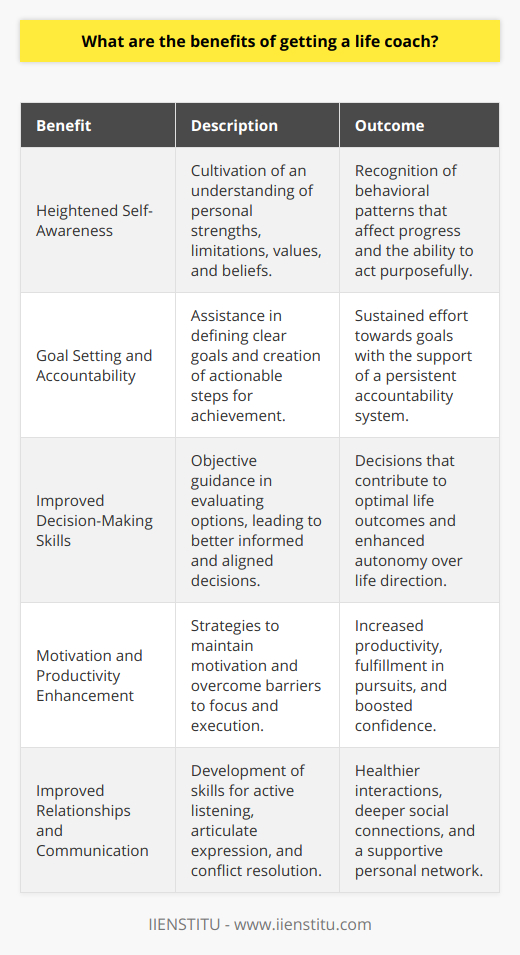
Why do people want to become life coaches?
Reasons for Pursuing Life Coaching
Fulfillment from Helping Others
A primary reason people aspire to become life coaches is the desire to help others grow and achieve their goals. Life coaching provides an opportunity for individuals to harness their communication and motivational skills to support clients in various aspects of their lives. Such professionals gain immense satisfaction from playing a pivotal role in their clients' progress, resulting in personal fulfillment and a sense of purpose.
Personal Development and Growth
Another reason individuals pursue life coaching is the potential for personal development and growth. Life coaching necessitates continuous learning, self-reflection, and skill-building to remain effective and relevant in the field. As a result, coaches benefit from continuous improvement in areas such as emotional intelligence, problem-solving, and decision-making, leading to enhanced overall personal and professional development.
Flexible Career Opportunities
Life coaching offers flexible career opportunities that appeal to many people, especially those seeking a better work-life balance. The autonomy in running a coaching business entails choosing the hours of work, selecting clients, and deciding on the preferred means of delivering coaching sessions. The lack of rigid structures in this field of work is an attractive feature that contributes to the increased interest in life coaching.
Financial Incentives
It is worth noting that the potential for lucrative financial rewards is also a motivating factor for individuals to become life coaches. As people invest more in their personal growth and well-being, the demand for skilled and effective coaches continues to rise. Successful life coaches are therefore able to earn a comfortable living, providing a significant incentive for those selecting this career path.
In conclusion, people are increasingly drawn to the life coaching profession due to the fulfillment derived from helping others, opportunities for personal growth and development, flexibility in career options, and potentially lucrative financial rewards. The ability to make a meaningful impact while simultaneously benefiting from personal and professional advantages makes life coaching an appealing choice to a growing number of individuals.
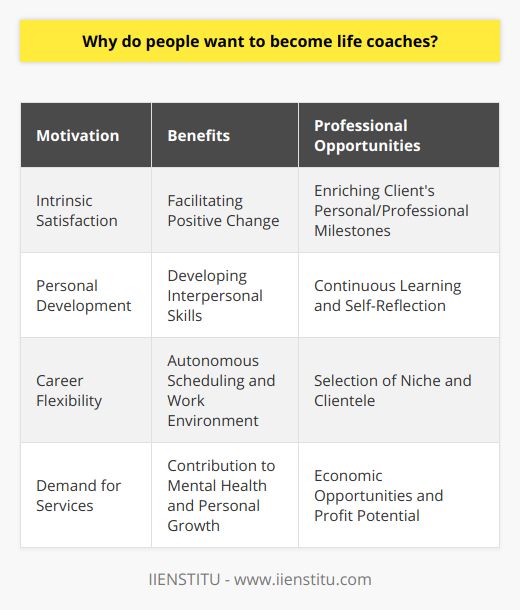
Why should coaches be certified?
The Importance of Certification
Certification ensures the competency of coaches and protects the interests of athletes. By obtaining proper certification, coaches demonstrate their commitment to providing high-quality instruction, upholding ethical standards, and staying current with industry best practices. This, in turn, helps to foster trust and respect in the coaching profession.
Quality Instruction
Coach certification programs exist to ensure that coaches have the necessary knowledge and skills to effectively teach and lead athletes. Certified coaches are more likely to provide meaningful learning experiences, ensuring that athletes master the fundamentals and make progress towards their goals. As such, athletes can have confidence in the expertise of their certified coaches, knowing that they have undergone rigorous professional development to attain appropriate credentials.
Ethical Standards
With certification comes the responsibility to adhere to a code of ethics that governs professional conduct. Certified coaches are expected to prioritize athlete safety, promote fair play, and maintain a supportive environment for their participants. By holding themselves to these ethical standards, certified coaches foster an atmosphere of trust and respect within their teams, as well as within the larger coaching community.
Professional Development
Coach certification often requires ongoing professional development, ensuring that coaches remain up-to-date with industry practices, trends, and research. By dedicating themselves to continuous learning, certified coaches demonstrate their commitment to improving their abilities and taking full advantage of new ideas and techniques. As a result, athletes benefit from innovative and evidence-based coaching practices, which can enhance their experience and overall development.
In Conclusion
In short, coach certification serves as a mark of professionalism and expertise, assuring athletes, their families, and the larger sports community that a coach is well-equipped to provide quality instruction and maintain ethical standards. By investing in professional development and striving for continuous improvement, certified coaches contribute to the growth and development of their athletes, providing the necessary support and guidance for them to reach their full potential. The commitment to certification ultimately serves to elevate the standards of coaching as a whole, enhancing the quality of sport and the experiences of athletes.

What are the underlying motivations behind seeking life coaching services?
Underlying Motivations for Life Coaching
Personal Growth and Development
Individuals often seek life coaching services for personal growth and development. They might have a desire to improve specific areas of their life, such as communication, relationships, or career. Life coaching can provide tools and strategies for self-improvement and achieving personal goals.
Overcoming Obstacles and Challenges
Life coaching can be highly beneficial for people facing obstacles or challenges. These may include career setbacks, a lack of purpose, struggles with mental health or personal relationships, among others. A life coach can offer guidance and support during difficult times, helping individuals overcome these barriers and achieve their full potential.
Enhancing Work-Life Balance
Maintaining a healthy work-life balance is crucial for overall wellbeing. However, managing various personal and professional responsibilities can often become overwhelming. Life coaching can offer strategies for prioritization, time management, and stress reduction, typically leading to more harmonious, fulfilling lives.
Increasing Self-Awareness
Self-awareness is an integral component of personal growth. Life coaching allows individuals to gain a deeper understanding of their thoughts, emotions, and behaviors, which helps them recognize their strengths, weaknesses, and potential areas for improvement. Increased self-awareness can lead to more informed decision-making and, ultimately, a higher level of satisfaction in life.
Goal Setting and Achievement
Setting clear and achievable goals is necessary for personal and professional success. However, individuals may struggle with defining their ambitions, developing action plans, or maintaining motivation. Life coaching can assist in breaking down goals into manageable steps, tracking progress, and identifying opportunities for growth.
Accountability and Support
One of the main motivations for seeking life coaching is the opportunity for accountability and support. A life coach can regularly check in with clients, monitor their progress, offer encouragement, and hold clients accountable for their actions. This ongoing partnership can help individuals stay focused on their goals and maintain motivation throughout their personal development journey.
In conclusion, the motivations behind seeking life coaching services are primarily related to personal growth and development, overcoming obstacles, enhancing work-life balance, increasing self-awareness, goal setting and achievement, and the need for accountability and support. Life coaching offers valuable tools and strategies for individuals seeking to improve their everyday lives while working toward greater personal satisfaction and success.
